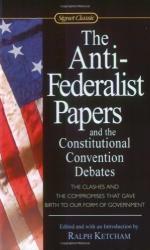
|
| Name: _________________________ | Period: ___________________ |
This test consists of 15 multiple choice questions and 5 short answer questions.
Multiple Choice Questions
1. What was the vote tally when the Pennsylvania Convention voted on the Constitution?
(a) 35-34.
(b) 36-33.
(c) 51-18.
(d) 46-23.
2. What did the draft of the Constitution contain concerning slavery?
(a) The draft outlawed the importation of slaves.
(b) The draft prevented a tax or prohibition on slavery.
(c) The draft outlawed the domestic slave trade.
(d) The draft did not mention slavery explicitly.
3. What was the original proposal for the residency requirement for citizenship?
(a) 2 years residence.
(b) 7 years residence.
(c) American birth.
(d) 14 years residence.
4. What was eliminated from the Constitution draft?
(a) Restriction on imports.
(b) Protections against taxes on slavery.
(c) Laws governing territories and provinces.
(d) Property qualifications for office.
5. What did the convention call for on July 26?
(a) A committee to write a draft of the agreed-upon points.
(b) Proposals for executive term limits.
(c) A vote on ratification.
(d) A committee to resolve the Virginia Plan and the New Jersey plan.
6. What threat did Mr. Pinckney make if Congress has power to restrict the slave trade?
(a) To filibuster.
(b) To secede.
(c) To march on Washington.
(d) To withhold ratification.
7. How many delegates signed the Constitution?
(a) All but three.
(b) All but thirteen.
(c) All of them.
(d) All but twenty-three.
8. Who was the "Federal Farmer"?
(a) Mr. Mason.
(b) James Madison.
(c) Melancton Smith.
(d) Horace DeWitt.
9. What was Mr. Gerry's fear regarding the ratification of the Constitution?
(a) He feared that his constituents would not ratify the draft.
(b) He feared that Congress did not have enough power to check the executive.
(c) He feared that the states were not equally represented.
(d) He feared that Senators' terms are too long.
10. What did "Centinel" argue on the danger of checks and balances?
(a) He argued that checks and balances would make the government slow to respond to military threats.
(b) He argued that checks and balances would obscure corruption and tyranny.
(c) He argued that checks and balances would create an endless torrent of inter-branch lawsuits.
(d) He argued that checks and balances would paralyze the government.
11. What did the Pennsylvania dissenters recommend to the Constitutional Convention?
(a) Trial by jury in property conflicts.
(b) Trial by jury in all federal cases.
(c) Limitations on the expansion of the United States.
(d) A standing army that would still exist in peacetime.
12. What argument did James Madison make concerning the fear of a centralized government?
(a) He said that taxation would be smaller under a central government.
(b) He said that the standing army would only be used outside the borders.
(c) He said that there would be less regulation of business and commerce by a central government.
(d) He said that factions would check each other.
13. What was James Wilson calling for in his speech to the Pennsylvania legislature?
(a) Ratification of the Constitution.
(b) Judiciary oversight of the executive.
(c) States rights.
(d) Revision of the Constitution.
14. What did Massachusetts propose in its ratification process?
(a) Restrictions on taxation power.
(b) Restrictions on the standing army.
(c) Freedom of speech.
(d) Restrictions on alcohol sales.
15. What did James Wilson argue concerning the question of taxation?
(a) He argued that it would result in better services.
(b) He argued that it was necessary.
(c) He argued that the European nations were taxed more heavily.
(d) He argued that the government would use tax money wisely.
Short Answer Questions
1. What did Madison advocate concerning the election or appointment of the executive?
2. What did Gouverneur Morris advocate about executive veto power?
3. What is the current residency requirement for citizenship?
4. What did "Federal Farmer" complain about in his second letter?
5. What position was James Wilson asked to take in the Constitutional debate?
|
This section contains 715 words (approx. 3 pages at 300 words per page) |

|




